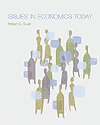

 Issues in Economics Today Overstatement of the Cost of Living by the CPI Multiple Choice Quiz |

 2003 McGraw-Hill Higher Education
2003 McGraw-Hill Higher EducationAny use is subject to the Terms of Use and Privacy Policy.
McGraw-Hill Higher Education is one of the many fine businesses of The McGraw-Hill Companies.